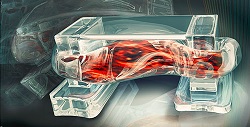 |
| Graphic depiction of a muscle cell (red) with a hydrogel scaffolding (clear) used to "walk" forward--Courtesy of U. of Illinois |
Self-propelled drug delivery robots offer the type of precise targeting and maneuverability needed to make better treatments. And U.S. engineers have designed a type of robot that's powered by real muscle cells, offering controlled movement via electrical pulses, an innovation that could find its way into the drug delivery arena down the road.
The researchers at the University of Illinois at Urbana-Champaign created their "bio-bots" using 3D-printed hydrogels and living cells. At first, the team used heart cells from rats, but because heart cells continuously contract, they weren't as easily controlled as muscle cells, which contract with a specific electrical cue, according to a university report.
So with a contracting cell and a hydrogel scaffold, the bio-bot essentially "walks" along like an inchworm, a motion that could help it deliver specialized drugs in a highly controlled manner.
"Biological actuation driven by cells is a fundamental need for any kind of biological machine you want to build," lead author Rashid Bashir said in a statement. "We're trying to integrate these principles of engineering with biology in a way that can be used to design and develop biological machines and systems for environmental and medical applications. Biology is tremendously powerful, and if we can somehow learn to harness its advantages for useful applications, it could bring about a lot of great things."
The type of movement used by the bio-bot was inspired by the attachment of muscle, tendon and bone, the researchers say.
"It's only natural that we would start from a biomimetic design principle, such as the native organization of the musculoskeletal system," co-author Caroline Cvetkovic said. "This work represents an important first step in the development and control of biological machines that can be stimulated, trained or programmed to do work. It's exciting to think that this system could eventually evolve into a generation of biological machines that could aid in drug delivery, surgical robots, 'smart' implants or mobile environmental analyzers, among countless other applications."
- here's the U. of Illinois report